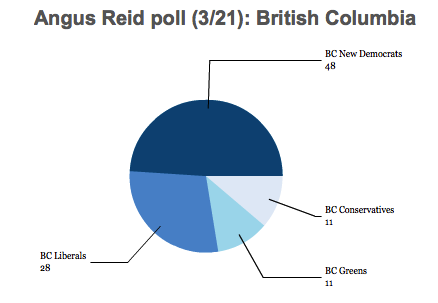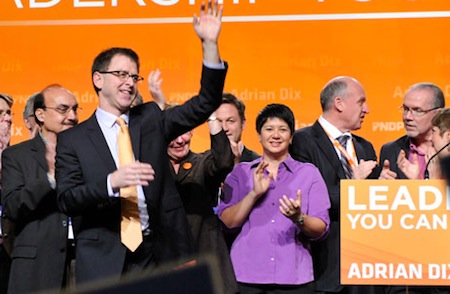With a month and a half before voters in Canada’s largest western province go to the polls, the New Democratic Party of British Columbia under opposition leader Adrian Dix seems set to take control of the provincial government after over a decade of rule by the British Columbia Liberal Party, though the official campaign has yet to begin.![]()
![]()
British Columbia is, in many ways, the future of Canada — oriented toward the Asia-Pacific rim, not toward the United Kingdom and the Atlantic. The province’s welcoming approach to immigration, including a large wave of Cantonese-speaking Chinese from Hong Kong in advance of the 1997 handover of Hong Kong control from the United Kingdom to the People’s Republic of China, was a prologue to what’s now happening all over Canada. As of a decade ago, while 75% of British Columbians spoke English only, just around 2% were exclusive French speakers, and nearly 25% spoke a number of languages other than English or French, and the province’s diversity has only grown in the past decade.
Nearly 10% of British Columbia’s population today is Chinese in origin, nearly 6% is Indian in origin.
The reality of British Columbia — and increasingly, the reality of Canada nationwide — is making nonsense of the eastern bilingual French/English divide that underlined the constitutional fights of the late 20th century.
With over 4.5 million people (around 13% of Canada’s population), it’s still less populous than Ontario or Québec, but it’s growing at a faster rate than either, with an economy split between a traditional dominance on forestry and tourism and the growing importance of mining — much like its neighbor to the east, Alberta.
Polls for the past year have shown a wide lead for the BC NDP in the elections scheduled for May 14 — a recent mid-March Angus Reid poll gives the BC NDP 48% support to just 28% support for the BC Liberals, and 11% each for the British Columbia Green Party and the British Columbia Conservative Party — the BC Conservatives take 17% in the province’s interior, while the Greens win 18% on Vancouver Island:
From 2001 to 2011, BC Liberal premier Gordon Campbell dominated provincial politics — he swept to office in 2001 with a 77-2 majority in the provincial Legislative Assembly, and was reelected with a 46-33 majority in the 2005 election and a 49-35 advantage in the 2009 election. In his time in office, he passed one of North America’s most progressive carbon taxes and emission schemes, presided over the 2010 winter Olympics.
But after a decade leading the province, and after the implementation of a massively unpopular harmonized sales tax (which combined two sales taxes in the provinces into a single 12% tax), Campbell resigned in 2011 and was promptly appointed Canada’s high commissioner to the United Kingdom.
The February 2011 fight for the leadership split the BC Liberals on ideological lines, with the more progressive former deputy prime minister Christy Clark facing off against the more conservative provincial health minister Kevin Falcon, winning on the third ballot by a narrow 52% to 48%. Traditionally, the BC Liberals have attracted not only supporters of the federal Liberal Party, but also the Conservative Party as well, making it the dominant political party in recent decades of both the center-left and the center-right, with the more socially progressive BC NDP as its top competitor.
Falcon’s loss was met with a number of defections from the BC Liberals to the traditionally moribund BC Conservatives (they won 0.55% in 2005 and just 2.10% in 2010) — those losses, coupled with a turn from more moderate and leftist BC Liberal supporters toward the BC NDP and BC Greens have left the party flailing since Clark took office. It’s been more or less downhill for Clark ever since — she only narrowly won a by-election in Campbell’s old Vancouver riding by 595 votes to return to the BC Legislative Assembly. The BC Liberals have rebounded somewhat from a nadir when they were tied with BC Conservatives in the polls, though that has less to do with Clark’s strength than internal implosions within the BC Conservatives.
When you take a look at the previous election results, it becomes clear that the current polling forecasts are less a surge for the BC NDP than the implosion of the traditional coalition that supported the BC Liberals:
The BC NDP has an even newer leader — Dix, who won the April 2011 BC NDP leadership contest after Carole James, the BC NDP opposition leader since 2005, stepped down.
Dix (pictured below), who is bilingual in French and English, served as chief of staff to former BC NDP premier Glen Clark in the late 1990s, and entered the Legislative Assembly in 2005, is the prohibitive favorite to become the next British Columbian premier. As such, his party’s taken a moderate, cautious road so far, taking care not to alienate the BC business community, and allowed the campaign, so far, to become more about the implosion of the BC Liberal government than about Dix’s agenda for the province. Despite BC Liberal harping over the paucity of Dix’s platform, Christy Clark’s government remains so unpopular right now that it’s enough for the BC NDP to remain simply an unobjectionable alternative.
That’s clear from a recent interview with Dix, who’s even gone out of his way to find common ground with federal Conservative prime minister Stephen Harper:
So what we need is a stable government that focuses on the real problems of today, which are ensuring that young people have the skills they need for the jobs of the future, making sure that we invest in our infrastructure and land base so that we’re continuing to drive economic growth and addressing issues of sustainability. Those are key questions and I think what we need right now is thoughtful, serious government that addresses those key problems and that is what we intend to deliver.
One of the areas where the BC NDP and the BC Liberals will differ is in their position on the Northern Gateway project, a pipeline proposed first in the mid-2000s to transport natural gas and bitumen from Alberta to the British Columbia coast for transport to Asia. Despite its support by Clark’s provincial government and Harper’s federal government, it’s met opposition from the NDP opposition, First Nations groups and environmentalists.
In the meanwhile, Clark’s sole hope is that polling is as skewed as the polls in the April 2012 Albertan election, which showed that the longtime governing Progressive Conservative Party, also headed by a relatively new premier in Alison Redford, would lose the election to the more populist, socially conservative Wildrose. Ultimately, however, Redford was elected in her own right in a landslide, winning 61 seats to just 17 for Wildrose and 12 seats between Alberta’s NDP and Liberals.
Unlike Wildrose, however, the BC NDP is the long-established opposition and it controlled the provincial government just 12 years ago, so polls are likely less skewed, especially given that pollsters have had a year to correct the errors that led to such flawed surveys last year in Alberta. Moreover, its lead over the BC Liberals is a bit wider than any lead that Wildrose held last spring over the Albertan PC.
The BC NDP controlled the BC government from 1991 to 2001 (and previously in the 1970s), but despite the NDP’s success in the 2011 that led it to displace the Liberal Party as Canada’s official opposition to Harper’s federal government, NDP currently controls provincial governments only in Manitoba and Nova Scotia. So a return to power in British Columbia would be the jewel in the party’s provincial crown.
Historically, the NDP controlled Saskatchewan government for long stretches since the 1940s (originally as the Co-operative Commonwealth Federation), though its fallen far from its heyday with the rise of the broad right-left Saskatchewan Party in the 2000s. In addition, the Ontario NDP won power from 1990 to 1995 under premier Bob Rae, who’s now finishing what will be nearly two well-received year as interim leader of the federal Liberal Party.
Eighty-five members of the Legislative Assembly will be elected on May 14, in first-past-the-post voting in single-member districts.
Photo credit to Kevin Lees — Vancouver, January 2011.




3 thoughts on “BC NDP holds overwhelming lead in advance of British Columbia elections”